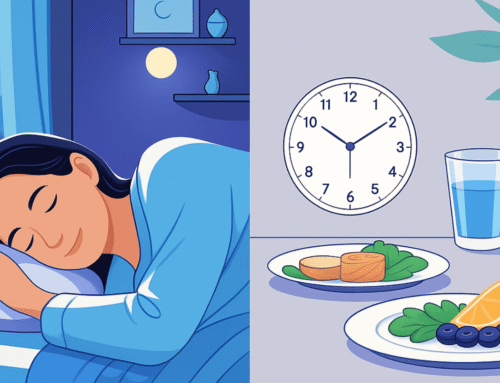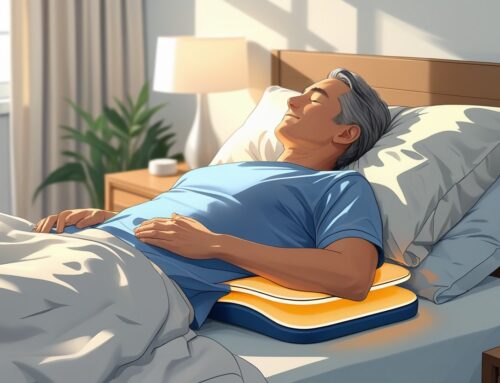Progesterone is important in sleep, especially for women dealing with hormonal shifts such as menopause. This hormone has a calming effect on the brain, which can help people fall asleep faster and rest more deeply. As people age, progesterone levels naturally drop, and that decline can lead to problems with sleep.
Because progesterone affects the parts of the brain that control sleep, changes in hormone levels can impact how well someone rests throughout different stages of life. Some studies show that progesterone supplements help postmenopausal women sleep better, but results are not the same for everyone. Health conditions, lifestyle, and overall hormone balance all influence how effective it may be.
Knowing when and how progesterone might be helpful for sleep is important before deciding to use it. Taking it should be guided by proper advice, since it can have side effects or interact with other treatments. Understanding its role gives people a clearer view of how hormonal changes affect sleep and what options they may consider to manage it.
Key Takeaways
- Progesterone can help improve sleep by calming the brain and cutting down the time it takes to fall asleep.
- Hormone levels shift with age and can affect rest, particularly during menopause.
- Safe use with proper guidance is important to balance benefits and avoid side effects.
- Lower progesterone may cause sleep issues, but using a supportive, pressure-relieving mattress can also help reduce discomfort and support deeper rest.
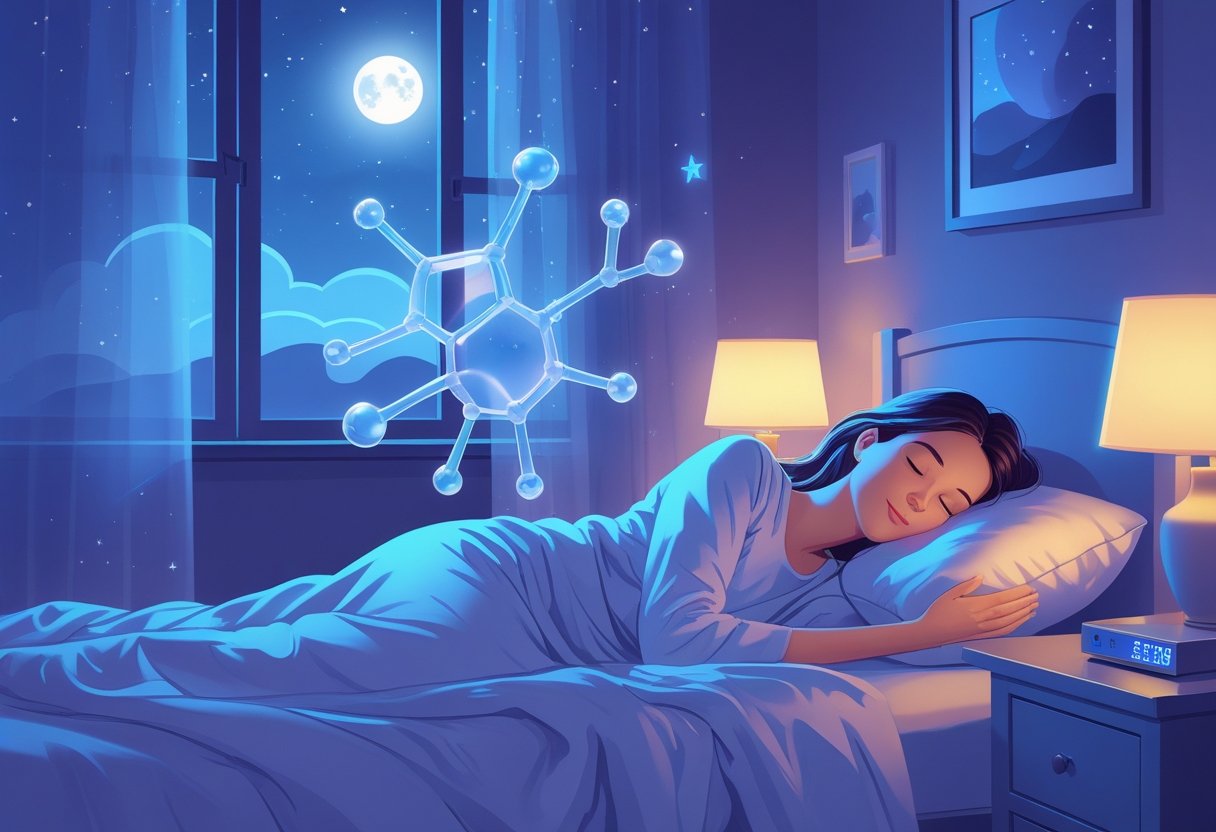
How Progesterone Affects Sleep
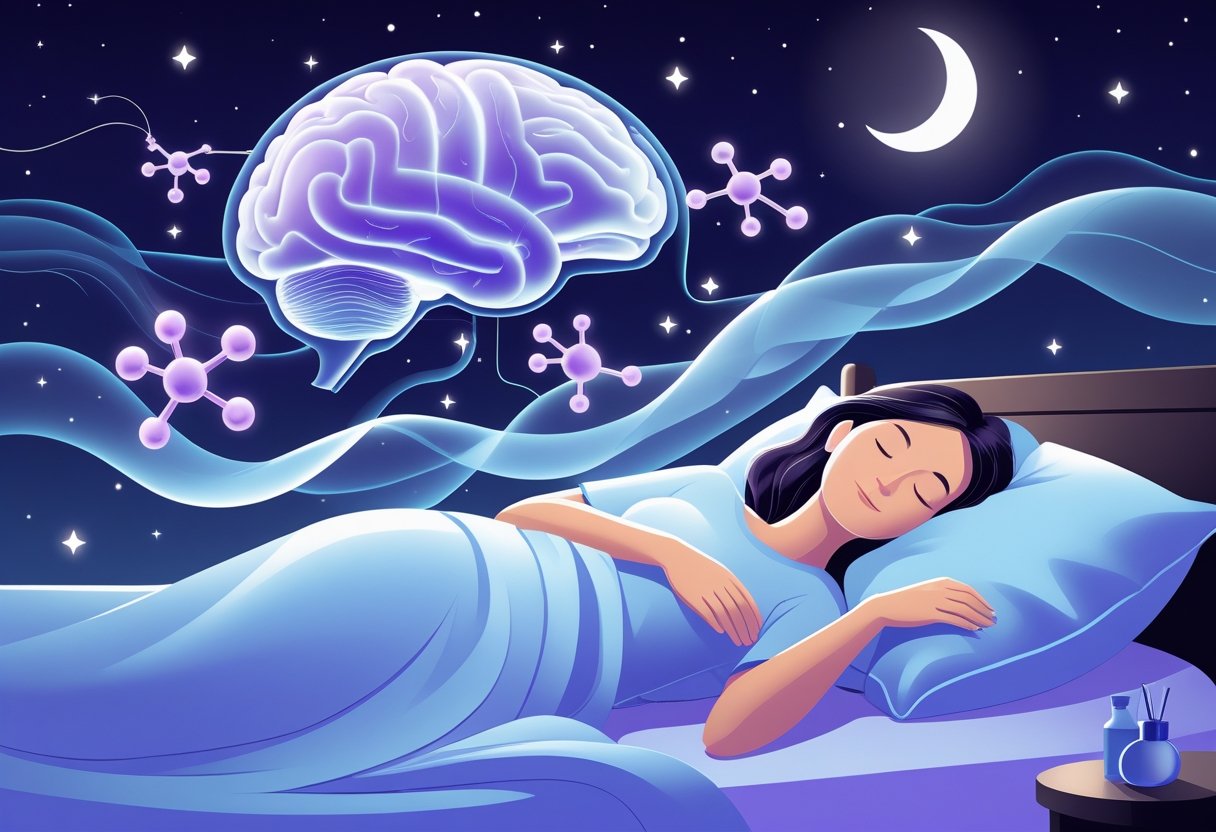
Progesterone plays a role in helping people sleep through several mechanisms. It can trigger sleepiness, influence different stages of sleep, and improve sleep quality. These effects happen both directly on brain receptors and through its metabolites, which change brain chemistry.
Mechanisms Behind Progesterone’s Sedative Effects
Progesterone works on the central nervous system by connecting to GABA-A receptors. These receptors help calm brain activity, and progesterone boosts the brain’s natural inhibitory signals. The result is a sedative effect that can make someone feel sleepy and less alert. It also influences breathing by stimulating respiration, which may improve sleep, especially in conditions like sleep apnea.
Progesterone also helps regulate stress hormones like cortisol, balancing alertness and relaxation. This is why progesterone can increase fatigue and help with falling asleep.
Effect on Deep Sleep and Sleep Cycles
Progesterone supports non-REM deep sleep, also called slow-wave sleep. This stage is key for restoring the body, repairing tissues, and consolidating memory. During the luteal phase of the menstrual cycle, when progesterone levels are high, sleep duration increases. Women may sleep longer and have steadier sleep cycles, though some notice vivid dreams or nightmares.
Unlike many sleep aids that reduce deep sleep, progesterone preserves it. It may help people with trouble sleeping due to low progesterone or those who want to maintain healthy sleep patterns.
The Role of Allopregnanolone in Inducing Sleep
Allopregnanolone, a metabolite of progesterone, has strong effects on sleep. This natural neurosteroid affects the GABA-A receptor even more than progesterone itself. It adds to the calming and sedative effects linked to progesterone. Allopregnanolone can improve slow-wave sleep and reduce interruptions, which supports better sleep quality.
Changes in progesterone and allopregnanolone may explain why women notice shifts in sleep patterns during the menstrual cycle or menopause.
Why and When to Take Progesterone for Sleep
Progesterone is commonly used to enhance sleep, particularly for individuals undergoing hormonal fluctuations such as menopause. Dosage and timing influence its effectiveness at inducing sleep. Knowing how it causes sleepiness and when to use it can be effective in eliminating side effects and optimizing its benefits.
Best Time for Administration of Progesterone
Progesterone is typically taken at night since it complements the body’s natural cycle. Progesterone promotes relaxation by enhancing GABA activity in the brain, which has a soothing effect. Taking progesterone before sleep induces individuals to sleep quicker and sleep longer.
Morning doses can cause unwanted daytime drowsiness, so most healthcare providers recommend taking progesterone 1-2 hours before bedtime. This aligns with the time it takes for the hormone’s calming effects to begin. For many, this timing improves sleep quality without interfering with daytime alertness.
How Long Progesterone Induces Drowsiness
The calming effects of progesterone generally begin within 1 to 2 hours of oral ingestion. Such effects can last for approximately 4 to 6 hours, which comprises the major part of the nighttime sleeping duration. Such a period ensures not giving rise to prolonged drowsiness the next day.
Individual responses to progesterone can differ. Some may be sleepy for a shorter or longer duration based on dosage, metabolism, and other variables such as age or hormone levels. Tracking responses to progesterone can help to make dose or timing changes for optimum results.
Nighttime Dose Considerations
Dosage is based on personal requirements and physician suggestions. Typical doses for insomnia range but tend to be 200 to 300 mg, particularly when taken as a tablet at night. Doses lower than this could be sufficient to alleviate insomnia or minimize night sweats associated with low progesterone.
Taking progesterone in the evening reduces side effects during wakefulness, such as dizziness or drowsiness. It also controls symptoms like hot flashes that interfere with sleep. Individuals should not drive a car or use machinery until they know how progesterone will react with them. Always take healthcare recommendations regarding safe and effective use.
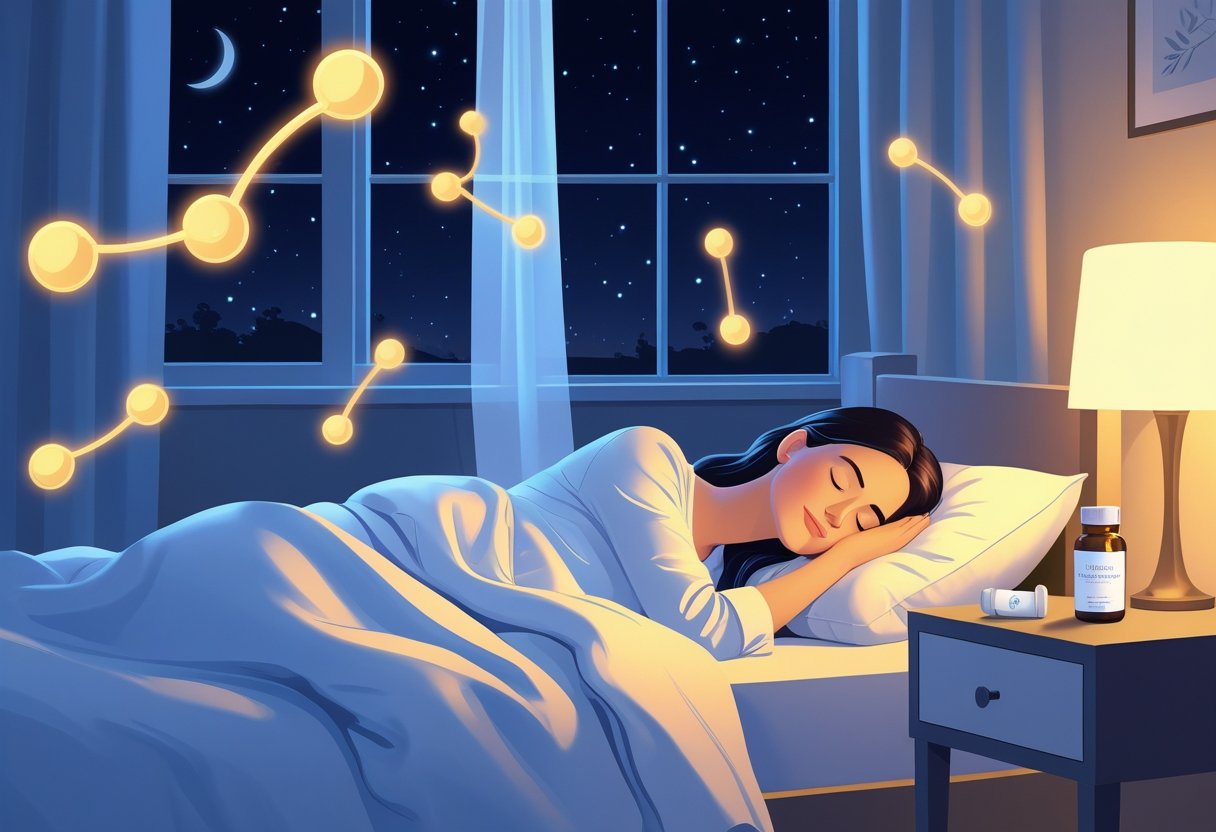
Progesterone, Insomnia, and Possible Side Effects
Progesterone may have varying effects on sleep. It is used by some to enhance sleep, while others develop sleep disorders. Its effects on insomnia and the quality of sleep depend on response as well as hormone levels.
Does Progesterone Cause or Help Insomnia?
Progesterone can help sleep by creating a calming effect in the body. It may increase the time spent in deep sleep, which allows for better rest. Many women notice fewer insomnia symptoms when progesterone levels are balanced, especially during the luteal phase or menopause. But some people may find their sleep worsens when taking progesterone. This can depend on the dose, timing, or method of use. Its calming effect can be helpful, but it does not always fix insomnia for everyone.
Progesterone Insomnia Side Effects
Common side effects of progesterone include dizziness, drowsiness, and mood swings, which can affect sleep routines. Breast tenderness and bloating are possible but usually do not disturb sleep directly. In some cases, progesterone can lead to restlessness or waking up several times at night.
Side effects may decrease over time or with dose adjustments. Patients should monitor symptoms and discuss them with their healthcare professionals.
Can Progesterone Cause Sleep Disturbances?
Progesterone may disrupt sleep for some people. Changes in hormone balance can trigger night sweats or worsen sleep apnea, especially in postmenopausal women with low baseline progesterone. Progesterone acts as a respiratory stimulant. It can improve or interfere with breathing during sleep depending on a person’s condition. Sleep disturbances are uncommon but can occur in sensitive individuals or those with existing sleep problems.
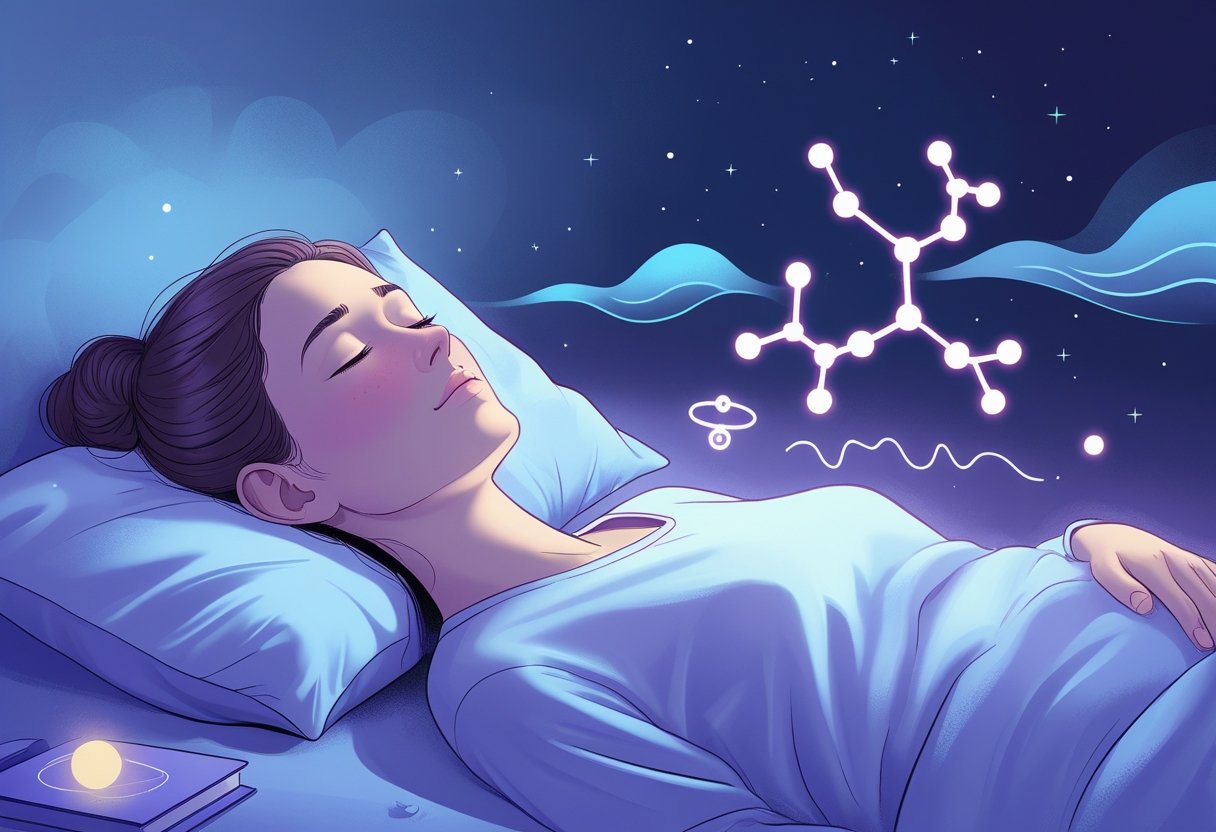
Progesterone and Sleep in Special Populations
Progesterone has an important role in supporting sleep for people affected by hormonal changes or sleep problems. It can help reduce issues like insomnia and breathing disruptions during sleep. How well it works depends on the stage of life and specific conditions a person is experiencing.
Progesterone for Sleep After Menopause
Many women have trouble falling or staying asleep after menopause. Research shows that micronized progesterone can help improve sleep quality in this group. It can shorten the time it takes to fall asleep and reduce waking up at night.
Studies usually look at postmenopausal women taking progesterone alone or with estrogen. Progesterone may help sleep because it calms the brain and promotes relaxation. Some studies show women feel they sleep better, though the total sleep time may not always change. Progesterone can also ease symptoms like hot flashes, which disrupt sleep. More research is needed to understand its effects when used by itself for sleep after menopause.
Hormonal Changes and Sleep Disturbances
Hormonal shifts affect sleep at many stages, including the menstrual cycle and pregnancy. For example, during the late luteal phase, lower progesterone levels are linked to worse sleep and insomnia.
Metabolites of progesterone have a calming effect on the brain, which explains why low or fluctuating levels can disturb sleep. Taking progesterone during these times can help improve sleep, especially for women sensitive to hormone changes. In people with sleep apnea, progesterone can help breathing during sleep. It can reduce apnea events and lessen interruptions caused by breathing problems.
Progesterone Benefits at Different Life Stages
Progesterone affects sleep beyond menopause. It influences sleep at puberty, during childbearing years, and in pregnancy. Sleep changes usually follow shifts in progesterone levels at each stage.
In young women, progesterone helps deepen sleep. During pregnancy, it supports sleep even when there is physical discomfort. In men and some specific cases, progesterone may improve sleep apnea by helping breathing and sleep quality. Its calming effect on the brain and support for respiration can steadily help people with sleep problems caused by hormonal changes.

Considerations, Safety, and Side Effects
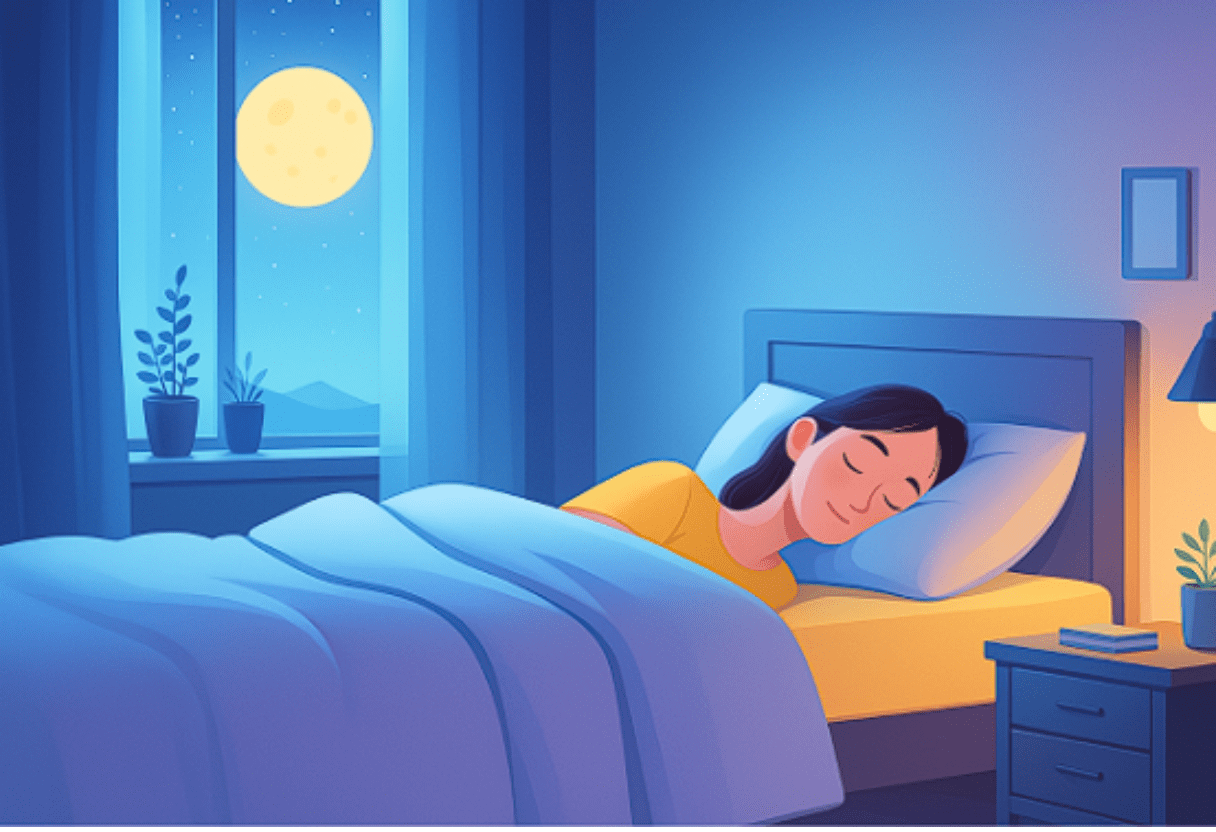
Progesterone can cause drowsiness, which usually lasts for a limited time. Side effects vary but are generally mild. Some people should avoid progesterone due to specific health risks. It is important to work with a healthcare professional to decide if progesterone is safe and appropriate.
Duration of Sleepiness With Progesterone
Progesterone can make you feel sleepy soon after taking it. How long this lasts depends on the dose and form. Oral micronized progesterone is more likely to cause drowsiness because the body changes it into calming compounds during digestion.
Sleepiness usually eases after a few days or weeks as your body gets used to it. Feeling tired for a long time is rare. Doctors can adjust the dose or timing to reduce daytime sleepiness and help with nighttime rest.
Potential Risks and Contraindications
Progesterone is not safe for everyone. People with a history of breast or reproductive cancers should be careful. It can also raise the risk of blood clots, so it is not recommended for those with clotting problems. Other side effects can include irritability, dizziness, bloating, or breast tenderness. These are generally mild and go away with time. Pregnant or breastfeeding individuals should not take progesterone unless a doctor prescribes it. It should also be avoided before surgery unless a healthcare professional approves.
Consulting a Healthcare Professional
Anyone thinking about progesterone should share their full medical history with a doctor. This includes current medications, supplements, and health concerns like sleep problems or mood changes. Doctors weigh the risks and benefits before prescribing progesterone. They may run tests and keep an eye on side effects. Reporting any new symptoms or issues during treatment helps keep it safe and effective.
When to Seek Guidance: Individual Factors and Monitoring
Pregnancy with progesterone for sleeping requires careful attention to how the body reacts. Each person’s hormones and sleep patterns are different, so careful monitoring is key. This helps avoid complications and ensures the treatment works as intended.
Measuring Sleep and Hormone Levels
Before starting progesterone for sleep issues, a healthcare professional should assess current sleep quality and hormone levels. Tools like sleep diaries, questionnaires, or sleep studies can show problems such as difficulty falling asleep or waking up frequently. Hormone testing can reveal imbalances in progesterone or other hormones like estrogen. Progesterone’s effect on sleep depends on these levels. Low progesterone, for instance, can be linked to poor sleep, especially during menopause or menstrual cycles.
Doctors also consider medical history, age, and medications, which can influence sleep and hormone function. This ensures that progesterone treatment is tailored to the individual and minimizes risks.
Monitoring Responses and Adjustments
Once progesterone treatment begins, its effects should be checked regularly. Follow-ups track changes in sleep quality and side effects such as drowsiness or mood shifts. Dosage and timing may need adjustment based on how a person feels and sleep measurements. Some respond well to lower doses that improve sleep without causing too much sedation.
Repeat hormone testing can help doctors see changes that affect sleep. Combining progesterone with lifestyle or behavioral strategies can improve results. Careful monitoring prevents overuse and supports safe, effective management of sleep problems tied to hormonal imbalance.
Mattress Choices That Help When Progesterone Disrupts Rest
When progesterone levels decrease or fluctuate, sleep may become agitated. Selecting the proper mattress can alleviate discomfort associated with hormonal changes and enhance sleep quality.
Temperature control in a mattress helps reduce hot flashes and night sweats, which can happen with hormonal changes. Materials like latex or natural fibers allow more airflow than older memory foam, keeping the bed cooler at night. Support matters too. A mattress that spreads weight evenly can ease pressure points and help reduce tossing and turning. Medium-firm mattresses work well for many people dealing with hormone-related sleep issues.
Some mattresses include cooling features, such as gel layers or breathable covers. These keep the body cooler during the night, which can help when progesterone shifts cause sweating. Motion isolation is useful if sleep is interrupted by movement. It absorbs motion so partners can sleep without disturbance. For couples, this means you won’t feel every turn or shift from the other person in bed.
The Leesa Original Mattress combines these qualities. Its cooling foam layers and medium-firm support help maintain comfort and stability. The adaptive foam shapes to the body without holding heat, easing pressure points while keeping the spine aligned. Many people with hormone-related sleep problems find it easier to rest through the night on this mattress.

Frequently Asked Questions
Progesterone is important in regulating sleep, especially in people with hormone changes like menopause. It can influence both how well someone sleeps and the patterns of their rest, depending on hormone levels and overall health.

